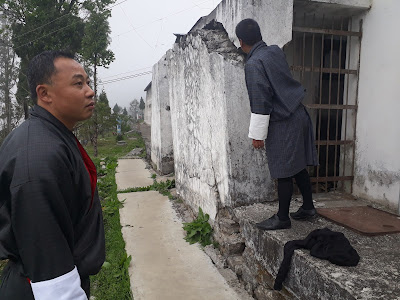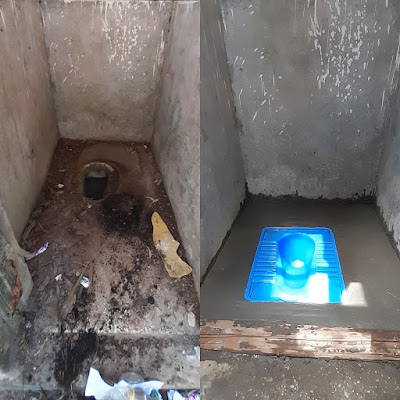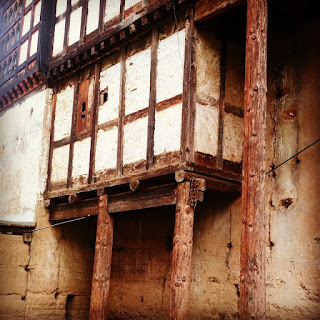My name is Chablop PaSsu. I am the founder of Bhutan Toilet Organization, and let me tell you that it’s NOT Normal for toilets to be dirty. I beg you to complain when you see a dirty toilet.
Remember, when we saw a picture of a guy climbing on a chorten, there was a massive outrage in our society (or at least on social media) because it was not normal to climb on a chorten. I wish if people could respond like that when they see a toilet that is left insanely dirty, because even that’s not normal.
We shape our concept of the toilet based on the kind of toilet we accept as normal.
Concept of Toilet
Let me redefine the concept of a toilet for you. It is the happiness room that we failed to acknowledge. People go in that room with many forms of discomfort and always come out happy; For example, you badly need to urinate or have an upset tummy. You run looking for a toilet in much pain and fear of humiliation in case you can’t hold it anymore. At that moment, the sight of a toilet brings you a sense of relief. Once you get inside, you experience the ultimate happiness. You are so grateful to the toilet that you are willing to do anything for the toilet. If we could trap on this very emotion and commitment, toilet problems in the country will be solved, but unfortunately, we have a very short memory.
Every morning, you wake up feeling low; your mouth is stinking, your eyes are sticky, your nose is stuffy, and your hair is messy. You walk into the happiness room, brush your teeth, wash your face, clean your nose, and do your hair, and by the time you come out from there, you are a new person, ready to seize the day. Anyone who goes to the little room comes back a little happier, so isn’t that room magical? Isn’t it the happiness room?
That is the concept of the toilet that we Bhutanese are unaware of. That’s why it’s not trendy to show off your toilet. We rather invest in a huge sofa, showcase, and TV in the sitting room, while the toilet remains tiny, dingy and stinky with many broken things inside it. Someone once told me that we Bhutanese wear expensive Gho and Keera over torn and faded underwear. We have misplaced our priorities.
We think a toilet is a dirty little room for us to pee and poop. Even so, of all the rooms in your house, the toilet is the only room that every family member uses at least five times a day. Yet, we invest the least in the toilet. It’s a sad example of a tragedy of the commons.
It's not our fault. It was passed down to us through our genes by our ancestors, who knew little about the toilet. But it will be our fault if we pass down the same stinky legacy to our children despite all the knowledge and exposure. We have come a long way, and much has changed, but we are still stuck with dirty toilets.
Everyone loves a clean toilet, yet collectively, we don't work towards getting it. It’s strange how the whole is less than the sum of its parts.
Attitude & Mindset
Our attitude toward the toilet is a personal affair as long as we keep it to ourselves, but when we project that in a group or society, it has consequences. It’s worse if you are an important person because it has a significant bearing on your decisions.
Let me share a story of setting up and managing toilets during major national events. You know how important it is to have toilet facilities during big public events. But you don’t know that we get last-minute notice to come and set up toilets, and there is no budget set aside to build toilets. It hurts when the toilet gets the last priority. On the contrary, a five-minute dance program gets two months of preparation, herding and feeding a few dozen heads. Whereas, the toilet that is used by everyone from morning to evening gets the least importance in the whole scheme of things.
That's just the beginning. The next problem is getting the location for the toilet. Toilets are often given the oddest locations, literally unreachable, perfectly hidden from the view. They would say it’s gross to have a toilet anywhere near. You could see the filthy sight and smell of the toilet right on their face as they explain why we can’t have the toilets in the vicinity.
I get angry, but I don't blame them. I blame the toilets they have suffered in their schools. They carry such bad memory of toilets that they are worried the toilet we will build will be like the ones in their heads.
If they had a clean toilet in their head, their decision would be different. They would want us to build the toilet next to the gate and the guest tents to be most convenient for everyone.
I found out that having a profound toilet attitude is critical in leadership. For example, if your school toilet is dirty, it reflects your principal’s ignorance and attitude. If your office toilet is horrible, it has everything to do with your boss’s mentality. He may want his attached toilet to be clean, but you could judge his leadership by the standard of the common office toilet. You do a simple survey and see how it correlates. You will smell it.
The irony goes much deeper in our society; We are a giving society, yet people will hardly share their toilet. Even a small restaurant toilet will put a “Costumers Only” notice. A rich landlord secretly dumps raw sewer from his property into the stream used for washing and drinking by poorer people downstream. A wealthy household talks proudly about having four toilets inside with no regard for the neighbourhood that has no toilet.
We forget that the flies from a poor neighbour’s open faeces will not discriminate against the people in the rich household.
Changing the Concept
But there is hope. We have seen in short periods we spent around event toilets how people's perceptions change. They visit us at least ten times on the event day (Imagine where would they run to if we didn’t arrange the toilets). The first time they come, they are suspicious. They cover their nose and mouth. When they come out, they look amazed. The next time they come, we see big smiles. And we become friends. The sudden change in their attitude is so satisfying. This is what we work for. This is the sign that we have finally managed to clean the toilet in their head. Next time, we know they will make a decision based on the clean toilet in his head.
The same attitude has influenced the locations of public toilets across the country. How many public toilets are there in Thimphu? There are seven in the core town, but you won't know because most of them are strategically hidden from the public view. It's ironic that the public toilets are hidden from public view, but that's what happens when the engineer or the planner has a horrific toilet in their head. They are only doing a favour to the country by hiding them. AND you know when the toilets are located in the shady corners, all sorts of shady things happen there—fights, drugs, theft, and vandalism.
You go to any public toilet and see if everything is in order. I bet you will see that most of them are vandalized, and you will be lucky if at least one flush tank works or you find a proper set of Bucket and Jug to use.
For a harmonious and peaceful country, why do our toilets look like we are in a state of war? The answer lies in the same place, the toilet in our heads. If the planners had clean toilets in their heads, we would have public toilets in good locations, and because of the location, we could avoid all sorts of shady activities, from pooping in the washbasin to stealing buckets jugs and TP rolls.
Personal Etiquettes
A civilized person will always look for a toilet when they get the call of nature, whereas some of us are still ok with going behind the bush. This habit of going behind the bush is not relevant when you are in a town. That's when you realize how backward you are. But somehow, you manage to find a spot behind a building and shamelessly shit there, knowing that no one will know and no one will even remember.
For that matter, such a person with no regard for toilet etiquettes will do the same even if he finds a toilet. He will use it without appreciating how good it was when he came in and leave with no regard for people who will go after him. The thought process is the same as the person who did it behind the building. No one has seen it; no one will know, and no one will even remember.
But let me tell you, what comes out of you is a PART of you. Even though no one saw you leaving without flushing, when people, who come after you see it, they will not like it. They will spit on it in disgust; you are going to feel the hate. No one will look at your shit and appreciate the shape and the colour of it; they will be disgusted. And the energy is powerful. When they spit on the part of you with such sincere disgust, you will feel it no matter where you are. That’s negative energy invoked by you. You bring out the worst in people as long as the part of you remain there.
On the other hand, if you have planted a tree somewhere, every time a person sits in its shade to take rest, the person will feel thankful to the tree, and that powerful and sincere energy of gratefulness will follow you wherever you are like a blessing. Same with a flower you planted that pleases people or a water tap you built that's helping people cool themselves and quench their thirst. What goes around definitely comes around. Let it be the good that goes around.
Next time you are about to leave the toilet unflushed, remember that ugly little part of you will bother many people and that so many curses will follow you. The idea is simple: even a cat knows. A cat digs a hole, poops in it and covers it up. It's nothing attractive to show to the world, so why don't you cover it up with soil if you are in the wild and make an effort to flush it down if you are in a toilet. Don't make your decision based on whether someone is watching or not. “Integrity is doing the right thing even when no one is watching.”
The job of Toilet Cleaning
Cleaning toilet is not one of the most attractive jobs in the world. On top of that, in many cultures, it is a job done by a class of people who are considered very low, untouchables. Lucky for us, we never had a deep-rooted toilet culture, and therefore the idea of the job belonging to any class of people is unfounded. Any notion of stigma attached to cleaning toilet is a borrowed mentality. Let’s shed that off.
Who cleans the toilet at home? Is there a category of people who must do that job? No, it's the job that any family member can do; one who loves cleanliness the most or the one who is good at the art of cleaning, or the one with an open mind to do the job. So, it's not about a class but rather an attitude—a progressive choice.
It’s in primitive and backward societies that such classes are created and discriminated against. In progressive societies like the US and Australia, toilet cleaning is like any other job. Ask hundreds of respected Bhutanese who have taken the job in Australia by choice.
Of course, the toilets down there cannot be compared to what we have here, and the difference in the kind of money they get down there and what we pay our cleaners here are almost impossible to fathom. This gives us a deep insight into why the western perspective on the job is different from ours. This will help us understand the reality of things and put our money in the right place. If we say toilet cleaners are important members of staff, we must back it up with good money to make it believable.
Until then, the show must go on. We must work toward uplifting the job to the next level through excellence in performing it and perceiving it. There is no humility greater than the act of cleaning a toilet.
The Liberator
And in doing so, when you clean an unflushed toilet, which was causing distress to many people, you act to liberate that unfortunate person who has done that. That person may be having a bad day somewhere. Not knowing what the hell he did wrong to deserve it, but you have shown mercy on him by removing the burden and setting him free. You liberate that person. You become a liberator.
Not just that, the clean and welcoming toilet that you have created will make every visitor happy, like the tree, flower, water tap I shared about, and the intense, positive energy they emit is the merit you accumulate. It will follow you wherever you are. You will receive their blessings.
Therefore, sometimes I feel the job of cleaning a toilet is a spiritual offering of humility and compassion, the humility of the self and compassion for others.
The Royal Vision of a First World Country
During the 113th National Day address, His Majesty the King shared his vision of propelling Bhutan to a first world country during our lifetime. In the last few years, His Majesty kept mentioning Big Data, AI, Block-Chain, Machine Learning, cryptocurrency, and Space science.
Even if there is nothing we could offer in these big subjects, let us make our individual contribution towards one of the most basic foundations of a first world country- a clean toilet.
Let’s clean the toilets in our heads and around us.
Let’s stop going behind the bushes.
Let’s stop tolerating dirty toilet.
Let’s complain.
Let’s prepare to become a first-world citizen.






























